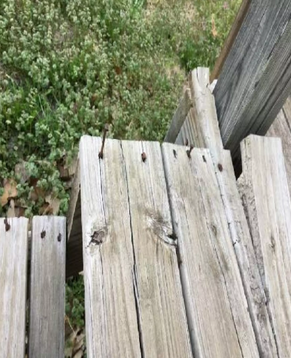
By CELIA LLOPIS-JEPSEN
Kansas News Service
Kansas let foster care children live in group homes with broken windows, mold, exposed electrical wiring, trashed porches and rodent droppings.
That’s according to an audit by the U.S. Department of Health and Human Services Office of Inspector General. Federal inspectors dug into the state’s system of group homes in 2018 and 2019, but their final report only came out this week.
The auditors say Kansas wasn’t making homes meet health and safety requirements, even though state inspectors visited regularly.
“The homes were generally allowed to maintain operations without making needed repairs,” they wrote in their report.
Before the audit went public, the Kansas Department for Children and Families reviewed and responded to the findings. It disputes part of the report, saying auditors at times missed important information and documents.

The agency also says it has made changes to improve oversight of group homes, spokesman Mike Deines said in an email to the Kansas News Service.
In 2018 and 2019, inspectors came to Kansas and visited all 31 group homes licensed at the time to house between 5 and 24 kids. They said they were met with walls that had holes in them, missing windows, subpar fire extinguishers, rundown playgrounds littered with trash, beds without proper bedding, long nails sticking out of wooden stairs and other dangerous debris.
At one place that housed six boys, they found an unsafe gas heater connected to an exposed natural gas line running through a child’s room. Another boy’s bed had an electric space heater pushed up against it, and the outside decks were in disrepair.
“Porches were propped up in a makeshift fashion,” the auditors wrote. “Trash and debris were strewn around.”
Twenty-four of the 31 homes violated physical health and safety rules, and 29 broke background check or fingerprint requirements. One place housed teenage boys and girls, even though its license only allowed it to care for the latter.
State inspectors knew but didn’t close the home or make it undergo licensing to care for boys, the auditors say. That home has since been stripped of its license and closed.
Federal auditors said 40 employees at the group homes had out-of-date background paperwork on file. More than 120 people had been on the job for more than a week before their employers submitted requests for background checks to the state. Paperwork was missing or undated for a few dozen more workers.
The state agency that oversees foster care pushed back against the findings regarding violations of environmental rules and background checks. Kansas also said it had begun reviewing employee lists at the homes monthly, and had stopped letting them put people to work before background checks are complete.
In its email to the Kansas News Service, DCF explained some of the changes.
“While we do not agree with all the audit teams' conclusions, we have taken several steps to correct deficiencies identified during the previous administration,” Deines said.

Gov. Laura Kelly took over in January 2019, and pledged to fix the state’s ailing foster care system, which had already come under fire for the deaths of several children, as well as putting children in crowded spaces, moving them too often and not doing enough to find children that go missing.
Under Kelly’s watch, DCF has worked to rope in higher-level supervisors when facilities have unresolved violations, Deines said, as well as put licensing staff through fire hazard training and added a manager position focused on group home oversight and licensing.
DCF also sent staff to each of the 31 homes in the federal audit, he said, to make sure the problems identified there get fixed.
Earlier this month, DCF settled a class-action lawsuit that accused Kansas of failing to provide mental health care to children in foster care, and of putting kids in a different home each night, or even keeping them in offices or other spaces not meant for housing.
Under the settlement, Kansas must work over the next few years to fix those problems and others. It has to make sure foster care sites don’t go over capacity and track whether children end up in jail or the juvenile justice system.
Celia Llopis-Jepsen reports on consumer health and education for the Kansas News Service. You can follow her on Twitter @celia_LJ or email her at [email protected].






